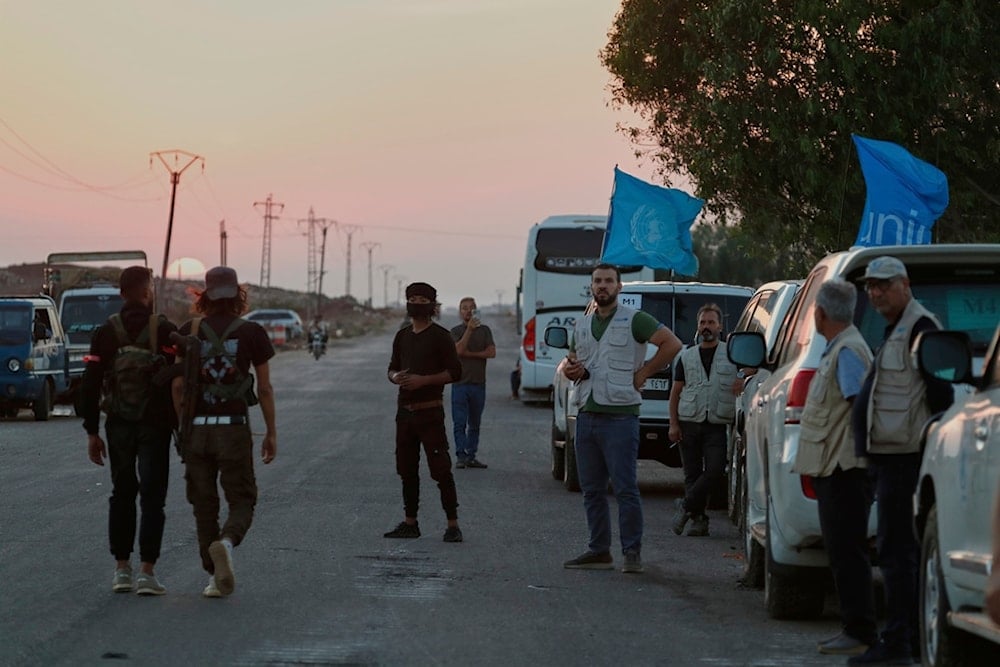US to host Israeli-Syrian talks on Sweida crisis: Reports
The US will host trilateral talks with "Israel" and Syria to address the Sweida conflict and prevent further escalation in southern Syria.
-

The sun sets as a convoy of ambulances and buses waits at a checkpoint in the village of Busra al-Harir, southern Syria, to enter Sweida province, Tuesday, July 22, 2025. (AP)
The United States will host a rare trilateral meeting between officials from Washington, "Israel", and Syria on Thursday to address the ongoing crisis in Syria’s southern Sweida province, Axios reported on Tuesday.
According to the report, senior representatives from the three sides will convene in an undisclosed location with the goal of establishing “security understandings” and improving coordination to prevent further escalation in the region.
A US official and another source familiar with the matter told Axios that the discussions will focus on stabilizing southern Syria, particularly amid recent violent clashes in Sweida involving armed factions and local Druze groups. US Envoy to Syria Tom Barrack is expected to chair the meeting.
This marks the first time delegations from the US, "Israel", and Syria have come together for direct talks since the outbreak of hostilities in Sweida earlier this month.
Clashes in Sweida spark international concern
On July 13, armed gangs launched attacks on Druze-populated areas in Sweida, prompting local defense units to respond. Days later, Damascus deployed army and Interior Ministry forces to contain the conflict.
According to Syria TV, the violence resulted in 558 deaths, 783 injuries, and the displacement of over 2,000 families to neighboring Daraa province. The UK-based Syrian Observatory for Human Rights estimated the death toll at more than 1,000.
Tensions further escalated on July 17 when the Israeli regime launched airstrikes targeting the Syrian General Staff, the presidential palace in Damascus, and military installations in Sweida. Israeli officials claimed the strikes were intended to “protect the Druze community,” though Damascus denounced the attacks as violations of Syrian sovereignty.
A Syrian security source claimed that all illegal armed groups had since withdrawn from the province.
Ceasefire declared amid shifting dynamics
On July 19, Syria’s interim president, Ahmad al-Sharaa, declared a comprehensive ceasefire in the southern region and called on all factions to respect the terms of the truce.
In its statement, the presidency cited "the sensitive circumstances the country is experiencing," affirming that the move was driven by a commitment to spare Syrian bloodshed, preserve national unity, and uphold the safety of the people. It also described the decision as part of a broader sense of national and humanitarian responsibility.
The presidency urged all sides to fully comply with the resolution, emphasizing the role of the Syrian state, its institutions, and its forces in implementing the ceasefire responsibly. The statement added that the goal is to restore stability and strengthen the constitution.
According to reports, Syrian security forces have begun deploying across several areas in Sweida to maintain public order, ensure the protection of civilians and their property, and facilitate access for humanitarian aid. The presidency also called on all parties to immediately cease hostilities in all areas without exception.
Foreign intervention behind renewed tensions in Sweida: al-Sharaa
Syrian interim President Ahmad al-Sharaa also said in a speech on Saturday that renewed tensions in Sweida are partly the result of external interference, including Israeli aggression and pressure from foreign actors.
In a televised address, al-Sharaa revealed that Syria had received international calls urging it to intervene in the situation in Sweida and restore security and stability to the southern province.
He pointed to Israeli involvement as a contributing factor in the resurgence of unrest in Sweida, specifically referencing recent bombings in the South and Damascus, warning that such interventions are exacerbating internal instability.
The interim president commended the role of the United States in helping secure the recently announced ceasefire in the province. However, he stressed that the Syrian state remains "the only side capable of preserving the country's sovereignty."
Al-Sharaa reiterated that Syria "is not a testing field for secessionist plans," emphasizing that unity and territorial integrity remain non-negotiable principles of the Syrian state.

 4 Min Read
4 Min Read








